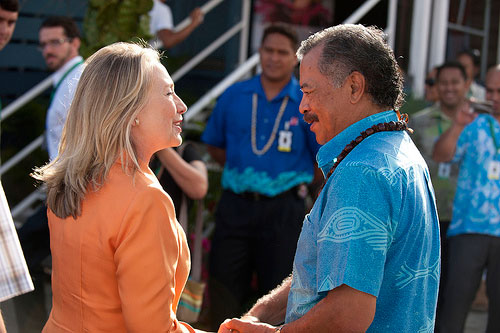Clinton stresses security in Pacific
 0 Comment(s)
0 Comment(s) Print
Print E-mail Xinhua, September 1, 2012
E-mail Xinhua, September 1, 2012
|
|
|
Hillary Clinton with Prime Minister Henry Puna at the Pacific Islands Forum in the Cook Islands. |
In a speech with a heavy emphasis on "security", U.S. Secretary of State Hillary Clinton told Pacific island leaders Friday that the U.S. was looking to an "American model of partnership" in the region.
Clinton told a gathering of Pacific island leaders in the capital of the Cook Islands that she was honored to be the first U. S. Secretary of State to participate in the Pacific Islands Forum (PIF)'s Post- Forum Dialogue Partners Meeting.
And she said the United States was willing to work with all other parties who had an interest in the Pacific such as "Japan, the European Union, China, other development partners who are here from the UK to Canada."
"We all have important contributions and stakes in this region' s success, to advance your security, your opportunity and your prosperity. I think, after all, the Pacific is big enough for all of us," she said.
The Obama administration had made a major push to increase engagement across the Asia-Pacific region, which it recognized as a "key driver of global economics and politics."
"That's why I have said that the 21st century will be America's Pacific century, with an emphasis on Pacific. The Pacific half of Asia-Pacific doesn't always get as much attention as it should, but the United States knows that this region is strategically and economically vital and becoming more so."
The U.S. sought to advance "a sound economic agenda that includes more free trade and increased investment in energy."
"And we strongly support good governance because sustainable growth and capable leadership go hand in hand with the respect for the rule of law and human rights," said Clinton.
"Another priority we share is security. All of us have an interest in maintaining peace and security in the Pacific. Hundreds of United States vessels from our navy and coastguard as well as our fishing vessels sail these waters.
"We know how important the ocean and the resources are to your economic development, food security and traditional culture, so we have worked to be a strong partner in fighting illegal and unregulated fishing and other crimes that take place at sea like human trafficking."
Emphasizing the U.S. sacrifices in the Second World War for the first time in her speech, she said the United States was also a Pacific nation.
"Seventy years ago Americans made extraordinary sacrifices on many of the islands represented here and we have since then underwritten the security that has made it possible for the people of this region to trade and travel freely," said Clinton.
"We have consistently protected the Pacific sea lanes through which a great deal of the world's commerce passes. And now we look to the Pacific nations in a spirit of partnership, for your leadership on some of the most urgent and complex issues of our time such as climate change."
The United States and the Pacific islands were bound by shared interests, shared values, a shared history and shared goals in which the U.S. had already invested and committed itself "for the long haul", Hillary Clinton said.
"We also know that how we work with you here in the Pacific is a very strong message to the people of the Pacific and even beyond and I take that very seriously," she said.
"Here in the Pacific and indeed across the world the United States seeks a model of partnership rooted in our common values, but which delivers practical benefits and helps you create strong economies and societies and we're pursuing this American model of partnership and we want our work here in the Pacific Islands to exemplify these standards."
Clinton mentioned that The United States spent 330 million U.S. dollars every year supporting the nations and people of the Pacific islands, while the Export-Import Bank of the United States had provided 3 billion U.S. dollars to finance trade and investment in the region.
Clinton said she would announce later Friday plans for new programs totaling more than 32 million U.S. dollars as part of the Asia-Pacific strategic engagement initiative she launched in July.
The projects would address sustainable economic development that protected biodiversity, such as a project to restore mangrove swamps in the Papua-New Guinea capital, Port Moresby, as wells as ocean conservation, climate change adaption and renewable energy.






